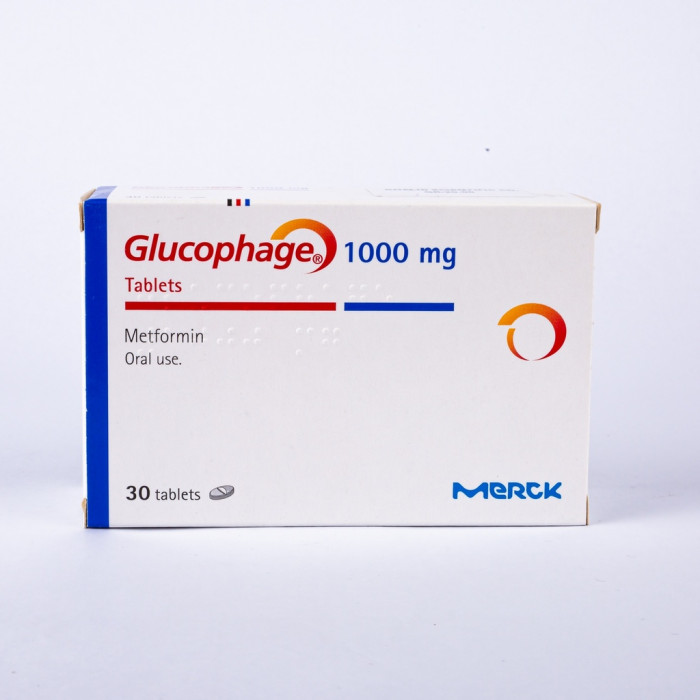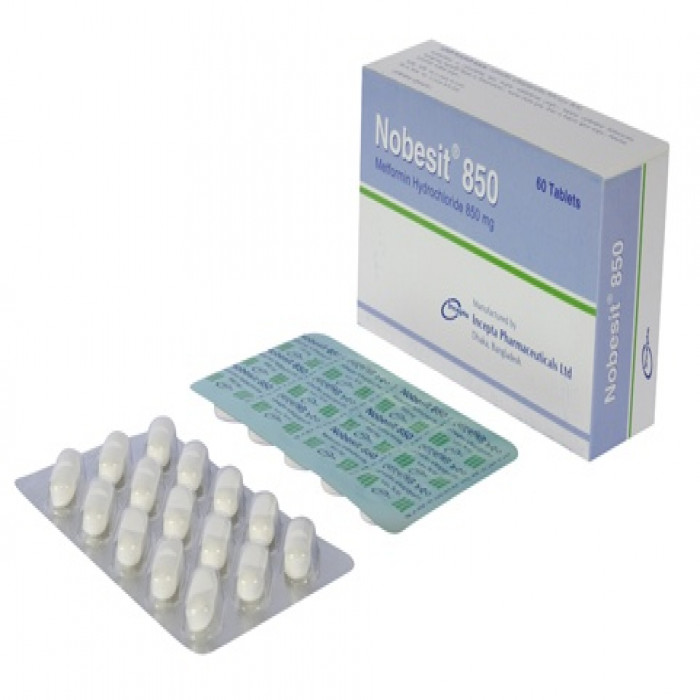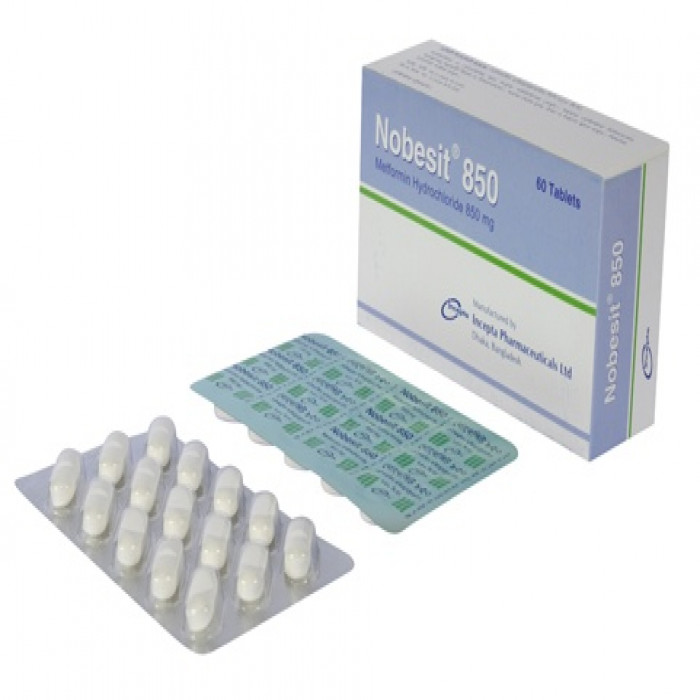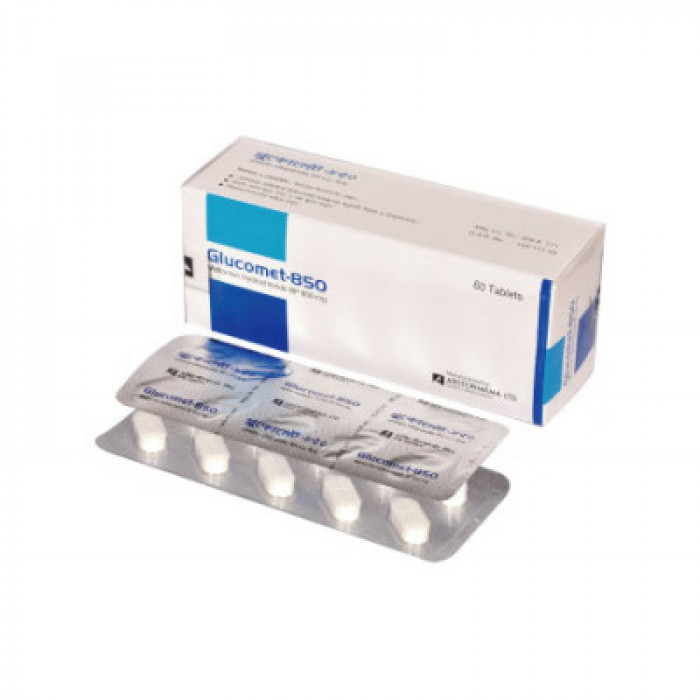
✔ 100% Authentic Product
👁️ Currently Viewing 240
100% Genuine Products, Guaranteed
Safe & Secure Payments, Always
Fast, Secure & Efficient Delivery
Proper Packaging
 Cash on Delivery - All over Bangladesh
Cash on Delivery - All over Bangladesh Regular Delivery - 8-12 Hours, Dhaka City
Regular Delivery - 8-12 Hours, Dhaka City Regular Delivery - 24-48 Hours, All Over Bangladesh
Regular Delivery - 24-48 Hours, All Over Bangladesh ফ্রি ডেলিভারি! - ৯৯৯ টাকা+ অর্ডারে ঢাকা
শহরে ।
ফ্রি ডেলিভারি! - ৯৯৯ টাকা+ অর্ডারে ঢাকা
শহরে । ফ্রি ডেলিভারি! - ২৪৯৯ টাকা+ অর্ডারে ঢাকার
বাহিরে ।
ফ্রি ডেলিভারি! - ২৪৯৯ টাকা+ অর্ডারে ঢাকার
বাহিরে ।
✅ Description:
Indications
Treatment of type 2 diabetes mellitus, especially in overweight patients, when nutrition and exercise alone are unable to provide optimal glycemic control.
Metformin can be used alone or in conjunction with other oral antidiabetic drugs or insulin in adults.
Metformin can be administered alone or in conjunction with insulin in children and adolescents as young as ten years old.
In overweight type 2 diabetes adult patients treated with metformin as first-line therapy following diet failure, there was a reduction in diabetic complications.
Pharmacology
Metformin is an antihyperglycemic medication of the biguanide class that is used to treat type 2 diabetes. Both baseline and postprandial plasma glucose levels are reduced. It has a different mode of action than sulfonylureas and does not cause hypoglycemia. Metformin enhances insulin sensitivity by increasing peripheral glucose uptake and utilization. It lowers hepatic glucose production, lowers intestinal glucose absorption, and lowers hepatic glucose production.
Dosage & Administration
Metformin immediate release tablet: Dosage of Metformin Hydrochloride must be individualized on the basis of both effectiveness and tolerance, while not exceeding the maximum recommended daily doses.
Adult: The usual starting dose of Metformin is 500 mg twice a day or 850 mg once a day, given with meals. Dosage increases should be made in increments of 500 mg weekly or 850 mg every 2 weeks, up to a total of 2000 mg per day, given in divided doses. For those patients requiring additional glycemic control, Glucomin may be given to a maximum daily dose of 2550 mg per day. Doses above 2000 mg may be better tolerated given three times a day with meals.
Children: The usual starting dose of Metformin is 500 mg twice a day, given with meals. Dosage increases should be made in increments of 500 mg weekly up to a maximum of 2000 mg per day, given in divided doses.
Metformin extended release tablet: Swallow Metformin XR tablet whole and never crush, cut, or chew.
Adult: The usual starting dose of Metformin XR is 500 mg once daily with the evening meal. The dose should be increased in increments of 500 mg weekly, up to a maximum of 2000 mg once daily with the evening meal, alternatively increased to 1000 mg twice daily taken with the meal. Patients receiving Metformin immediate release tablet may be switched to Metformin extended release tablet up to a maximum recommended daily dose.
Children: Metformin extended-release tablet has not been studied in children.
Renal impaired patient: Do not use Metformin in patients with eGFR below 30 mL/min/1.73 m2. Assess the risk/benefit of counting if eGFR falls below 45 mL/min/1.73 m2.
Interaction
Carbonic anhydrase (Topiramate, Zonisamide) co-administration may raise the risk of lactic acidosis. Drugs that inhibit Metformin clearance (Ranolazine, dolutegravir, Cimetidine) may cause Metformin buildup. Metformin's effect on lactate metabolism can be amplified by alcohol.
Contraindications
Hypersensitivity to the active ingredient or any excipient.
Acute metabolic acidosis of any kind (such as lactic acidosis, diabetic ketoacidosis).
Renal failure with a GFR of less than 30 mL/min.
Dehydration, severe infection, and shock are examples of acute diseases that might affect renal function.
Acute or chronic conditions that produce tissue hypoxia, such as cardiac or respiratory failure, recent myocardial infarction, shock, etc. Hepatic insufficiency, acute alcohol intoxication, and alcoholism are all examples of hepatic insufficiency.
Side Effects
Disorders of the circulatory and lymphatic systems: The following is unknown: Hemolytic anemia is a kind of anemia in which the red blood cells
Disorders of metabolism and nutrition: Lactic acidosis is a very unusual condition. During long-term metformin treatment, there is a decrease in vitamin B12 absorption along with a fall in serum levels. If a patient comes with megaloblastic anemia, such an etiology should be considered. In post-marketing experience, cases of peripheral neuropathy in patients with vitamin B12 insufficiency have been observed (frequency not known)
Taste disturbance is a common nervous system condition. The following is unknown: Encephalopathy.
Gastrointestinal issues, such as nausea, vomiting, diarrhea, stomach pain, and loss of appetite, are extremely prevalent. These side effects are most common during the first few weeks of treatment and usually go away on their own. Metformin should be taken in two or three daily doses during or after meals to prevent them. A gradual increase in dose may also help with gastrointestinal toleration.
Isolated cases of liver function test problems or hepatitis resolving after metformin cessation are extremely rare.
Skin and subcutaneous tissue disorders: Erythema, pruritus, and urticaria are extremely infrequent.
Pregnancy & Lactation
Uncontrolled diabetes (gestational or permanent) during pregnancy is linked to an increased risk of congenital malformations and perinatal mortality. When a patient intends to become pregnant or is pregnant, it is suggested that diabetes be managed with insulin rather than metformin to keep blood glucose levels as close to normal as possible, reducing the risk of foetal abnormalities.
Metformin is secreted in human breast milk during breastfeeding. In breastfed newborns/infants, no harmful effects were identified. Breastfeeding is not recommended when using metformin because there is insufficient data. The benefits of nursing and the potential danger of detrimental effects on the kid should be considered while deciding whether or not to stop breastfeeding.
Precautions & Warnings
Metformin Hydrochloride is known to be eliminated in large amounts through the kidneys, and the danger of Metformin buildup and lactic acidosis increases as renal function declines. Metformin has been linked to a reduction in vitamin B12 levels. When combined with insulin or an insulin secretagogue, it raises the risk of hypoglycemia.
Storage Conditions
Keep the temperature below 30°C and keep it away from light and moisture. Keep out of children's reach.
Disclaimer:
ePharma sole intention is to ensure that its consumers get proper
information as musch as possible. Although we do not guarantee the
accuracy and the completeness of the information that provided and
here information is for informational purposes only.
The information contained herein should NOT be used as a substitute
for the advice of a qualified physician. This may not cover
everything about particular health conditions,
lab tests, medicines, all possible side effects, drug interactions,
warnings, alerts, etc. Please consult your healthcare professional
and discuss all your queries related to any disease or medicine. We
intend to support, not replace, the doctor-patient relationship.

























